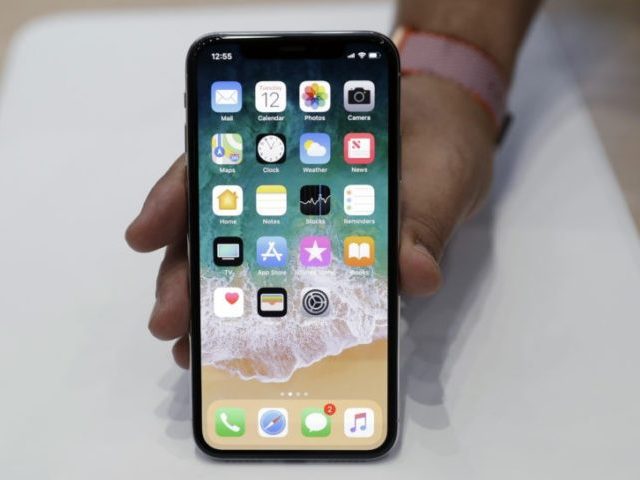Turkish President Recep Tayyip Erdogan lashed out against the United States on Tuesday and called for a boycott on American electronics to retaliate against the Trump administration’s tariffs on steel. It was not clear from Erdogan’s remarks if he plans to implement a government ban on U.S. electronics imports or merely wants Turks to refrain from buying them.
“Whatever we buy from abroad we are going to produce here in better quality and export it. We are going to boycott US electronics,” Erdogan said.
“If they have the iPhone, on the other hand, there is Samsung. In our country, we have Venus and Vestel. What we can do is proved by what we have done so far. Whatever we pay for from abroad, we will do here,” he said, referring to a cell phone made in Turkey.
Bloomberg News noted that Vestel’s phones use American-made components, so it might have trouble rising to Erdogan’s challenge over the long term, but in the short term, the company’s stock rose nine percent after Erdogan’s speech.
Erdogan described U.S. sanctions as an “economic attack” doomed to fail because “Turkey has one of the most solid banking systems in the world in all respects.” That opinion is not shared by international financial analysts, who worry Turkey’s economy is so weak and dependent on foreign money that American tariffs could trigger a collapse that drags European markets down.
Simon Tisdall summarized Turkey’s precarious position at the UK Guardian on Tuesday:
Turkey’s many troubles have wide geopolitical and strategic ramifications. The country is, as ever, awkwardly positioned between two ostensibly friendly but imperious powers: the US and Russia. Since taking national office in 2003, Erdoğan has tried to play them off against each other, with mixed success. Now the many contradictions in his policy positions are coming to a head, with unpredictable implications for Syria, Iran, Nato and already strained relations with Europe.
The overall picture is of a faltering regional power being squeezed between a rock and several hard places, the commentator Yavuz Baydar suggested on the Turkish news platform Ahval: “Ankara is in a diplomatic cul-de-sac. It is at odds with the US in the region and now faces a moment of reckoning vis-a-vis Russia. Meanwhile, the Kurds remain a reality near and within Turkey’s borders; a deepening economic crisis makes it increasingly vulnerable; and its erratic regional policy makes it difficult to pursue any dialogue that requires trust and steadfastness.”
Tisdall thinks Erdogan’s arrogant style and dictatorial ambitions have backed him into a corner because he cannot blame anyone else for Turkey’s sputtering economy and souring international relations. Erdogan certainly does not see it that way, as CNN found him hunting for scapegoats he can accuse of economic treason:
On Monday, Erdogan turned his attention to social media with the announcement that Turkish authorities are investigating 346 accounts that “provoke the currency rate increase,” the official news agency Anadolu reported.
The “law will be applied to those who release fake news about banks, financial institutions and companies that are open to public,” the Capital Markets Board of Turkey said in a statement.
The financial regulatory body said violators could face two to five years in prison.
Presidential adviser and spokesman Ibrahim Kalin wrote on Twitter: “Our ministry of treasury and finance, Central Bank, Capital Markets Board, Banking Regulation and Supervision Agency and other institutions take necessary steps for financial stability. Turkish economy’s body is solid. Nobody should give credit to speculative news. Turkey will be stronger at the end of this process.”
Turkey’s economic crisis boils down to heavy reliance on foreign investments made in dollars, while Turkish assets are valued in lira, and the lira has been declining at an alarming rate (although it appeared to stabilize somewhat on Tuesday).
In other words, Turkish assets are worth less and less compared to its foreign debts, and outside investors are growing reluctant to risk more money on a system that might be entering a death spiral. Erdogan’s arrogance, hot temper, dictatorial powers, and appetite for scapegoating make investors even more nervous.
Another problem is that Turkey’s debts are mostly held by private industries rather than the government, which makes the International Monetary Fund less likely to come to the rescue. Analysts also fear the nature of Turkey’s debts makes it more likely the country’s economic crisis will spread to other emerging economies or make investors more reluctant to invest in them.
CNBC quoted Northern Trust chief investment officer Katie Nixon’s take on the lira crisis:
How can a country where the entire market cap of Turkish equities traded on the Istanbul Stock exchange is less than the market cap of Netflix wreak such havoc? It is all about the direct and indirect impacts. There are certain emerging market countries with relatively weak currencies and a heavy reliance on external (predominately dollar-based) financing. The fear is that what happens in Turkey won’t stay in Turkey.
Another analyst cited by CNBC, Dennis Gartman, found it “dismaying” that the United States has “chosen to kick Turkey while the latter is down and suffering a severe bout of economic pain.”
The overall mood from observers is trepidation mixed with a mild confidence the Turkish economic crisis can be contained, but that depends largely on Erdogan and his stubborn refusal to release hostage American pastor Andrew Brunson.
Brunson filed a new petition for release on Tuesday, asking a Turkish court to “prevent unlawful political interventions by lifting judicial control provisions on the defendant.”
That is an unsubtle plea for the courts to end the U.S.-Turkey standoff by taking the Brunson decision out of Erdogan’s hands. If Brunson’s petition is not granted, his next court hearing is scheduled for October 12.

COMMENTS
Please let us know if you're having issues with commenting.